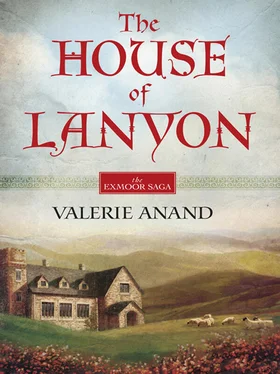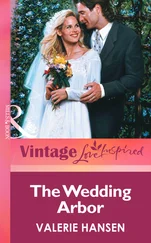“Farm folk are different from us,” said Aunt Cecy. She was patching one of Dick’s shirts, though because her eyesight was faulty nowadays, she had Margaret’s small daughter beside her to thread needles. “She’ll have to get used to a lot that’s different, out there on Allerbrook. She’s not in the shed. She went into the garden with a basket—said something about fetching in some mint.”
“I’ll call her,” said Margaret, and hastened out through the rear of the house.
Five minutes later she returned, frowning, and once more went upstairs. Great-Uncle Will, back in his familiar winter seat beside the hearth, remarked, “Looks as if Liza’s not in the garden. Funny.”
“She’ll have slipped off somewhere,” Aunt Cecy said. “She’s always had a fancy for going walking on her own, but Margaret told her she wasn’t to go out by herself anymore.”
“I did indeed,” said Margaret, reappearing on the staircase. “But she’s not in the garden and not upstairs, nor is she in the kitchen or at her loom. I’ve looked. And I’ve just been into her chamber and her toilet things are gone—the brush and comb and the pot of goose grease she uses for her hands. So I opened her chest and I could swear some of her linen’s missing. I don’t like it.”
Aunt Cecy said, “I can’t see so clear as I used to, but I thought I saw her talking to a fellow in the churchyard when we came out of the service on Sunday. He were pointing out something on the church roof. Looked harmless, but…”
“She might have gone across to see Elena for something,” said Margaret uncertainly.
“And she’d take her linen and toilet things for that, would she? Better look for her,” said Great-Uncle Will. “And fast.”
“So she’s not in any of our houses,” said Nicholas, who had been hurriedly fetched from the inn at the other end of the village, where he had been talking to a potential buyer of his cloth. “You’ve made sure, you say, Margaret. And she’s not in any of our gardens and some of her things are gone.” He turned to Will. “Great-Uncle, you said that according to the gossip that’s going about, she’s been meeting a red-haired clerk from the castle. I think I’ve seen him at church with the Luttrells.”
“That’s him. And that’s what’s being said, yes,” said Will.
“The fellow I saw her talking to on Sunday were outside the church and he had his cap on. But he were all in black, like a clerk,” said Aunt Cecy.
“I wish we knew his name,” said Nicholas, “but I think we know enough. I’m going up to the castle. Now.”
“Why is it,” grumbled James Luttrell, standing in his castle hall, wishing he could sit down to a peaceful supper and irritably aware that any such thing was out of the question for the time being, “why is it that trouble is so catching? The whole world’s disturbed these days and it spreads like plague. There’s no good government in the land, with all this squabbling between the king and these upstart cousins of his, Richard of York and his sons. What’s it matter if the king is weak in his mind? He’s been crowned and anointed and that ought to be good enough for any man.”
“But the point is…” began Father Meadowes, normally a stern and self-confident priest but unable to stem James’s irrelevancies.
“No one has any proper sense of their duty anymore. Even priests aren’t staying on the right path, it seems!” Abruptly James abandoned his excursion into national affairs and returned to the real matter in hand. “Are you sure Christopher Clerk has vanished, Father? He hasn’t gone on an errand and forgotten to let you know? Something urgent, perhaps?”
“I regret to say this, but I don’t think so,” said Meadowes. “He went out to meditate in the open air as he often does, but I expected him to return later and there was a matter to do with his studies that I wished to discuss with him. He hasn’t come back, and personal things are missing from his room. There has been village gossip concerning a girl. I took him to task and he assured me there was nothing in it, that he had merely escorted her home when she was accidentally separated from her family at the May fair and exchanged the time of day with her after church once or twice out of courtesy. Villagers do have a talent for making something out of nothing and I believed him then. I warned him to be careful and left it at that. Now, frankly, I wonder. Earlier this year he asked me some odd questions.”
“What sort of questions?” Elizabeth Luttrell asked. She was seated, working at an intricate piece of embroidery while Wagtail snoozed at her feet. “He always seemed so earnest,” she remarked.
“Yes, he did,” Father Meadowes agreed. “But the questions he asked were about leaving the church if a man changed his mind about his vocation. I asked if he were having doubts about his own and he said no. Now I’m wondering!”
“He’s always seemed very quiet and conscientious,” said James. “Too much so, perhaps, for a young man.”
“Yes, I felt that, too, sometimes,” Elizabeth said. “He was—is—so very…very self-contained, yet I sometimes felt that there was a side to him that was hidden.”
The two men looked at her with interest. Elizabeth, usually a quiet woman, had a knack of occasionally making very acute remarks. Sharp as an embroidery needle, her husband sometimes said.
She smiled at them. “All the same,” she added, “need we be anxious so soon? There could have been a misunderstanding…or even an accident.”
She broke off as the gatekeeper’s boy arrived in the hall at a breathless run and barely sketched a bow before exclaiming, “There’s a Master Nicholas Weaver from the village, zurs and mistress! He’s axin’ to see Father Meadowes and he says it’s that urgent—can Father Meadowes see him now, at once. He looks that worried, zurs!”
“Nicholas Weaver?” said James. “I know him. Hardworking man and a hardworking family, that’s him and his. It’s you he wants to see, is it, Father Meadowes? Maybe he’s got something to say about this mystery.”
“Christopher was talking with a girl after the service on Sunday,” murmured Elizabeth. “It looked quite innocent, but…I wonder…”
“The gossip,” said Meadowes ominously, “concerned a daughter of the Weaver family.”
“Fetch Master Weaver along, boy,” said James.
Nicholas came in with a firm tread, which concealed a secret hesitation. He had never been inside the castle before, never hitherto walked up the steep track from Dunster to the gatehouse with the castle walls and their towers and battlements looming ahead of him, and although he was not a man with a poor opinion of himself, he felt intimidated. At the gatehouse the porter had greeted him politely, but with an air of surprise. Villagers, even well-to-do ones like Nicholas Weaver, didn’t often call at the castle and certainly not to insist that they must immediately see men who held such dignified positions as castle chaplain.
Despite his secret misgivings, Nicholas had been resolute and he had been admitted, but now that he was actually inside, he was awed by the scurrying of the numerous servants and by the great, beamed hall, with its huge hearth and the dais where the family dined. Thick rushes underfoot silenced his footfalls, the rosemary sprigs strewn among them gave off their scent wherever one stepped and the walls were hung with tapestries: a huge, dramatic one of Goliath being downed by a gallant little David, and a pretty one with a background of flowers and a lady in the foreground with a unicorn beside her.
The fact that he had been led into the presence not only of Father Meadowes but of the Luttrells as well added further embarrassment. However, he bowed politely, murmured a conventional greeting and looked at the chaplain.
Читать дальше












